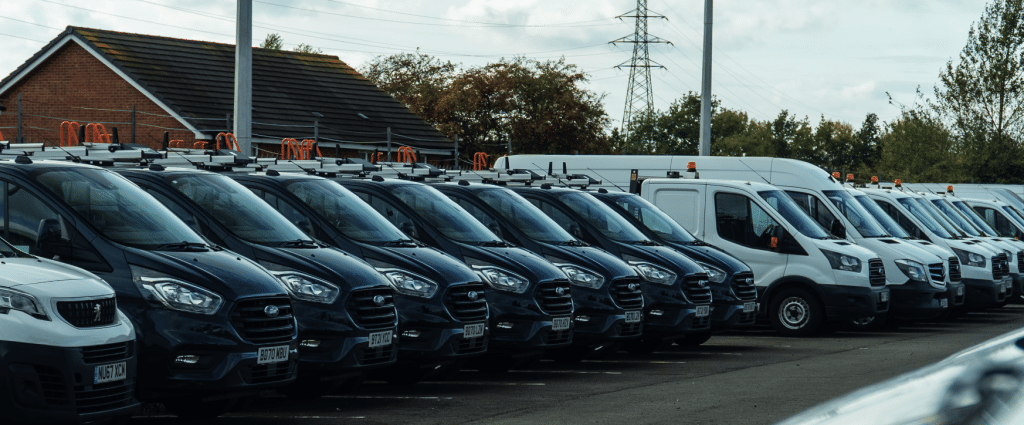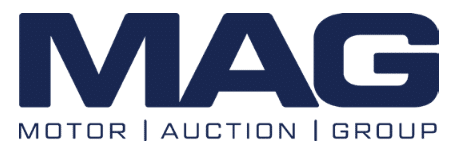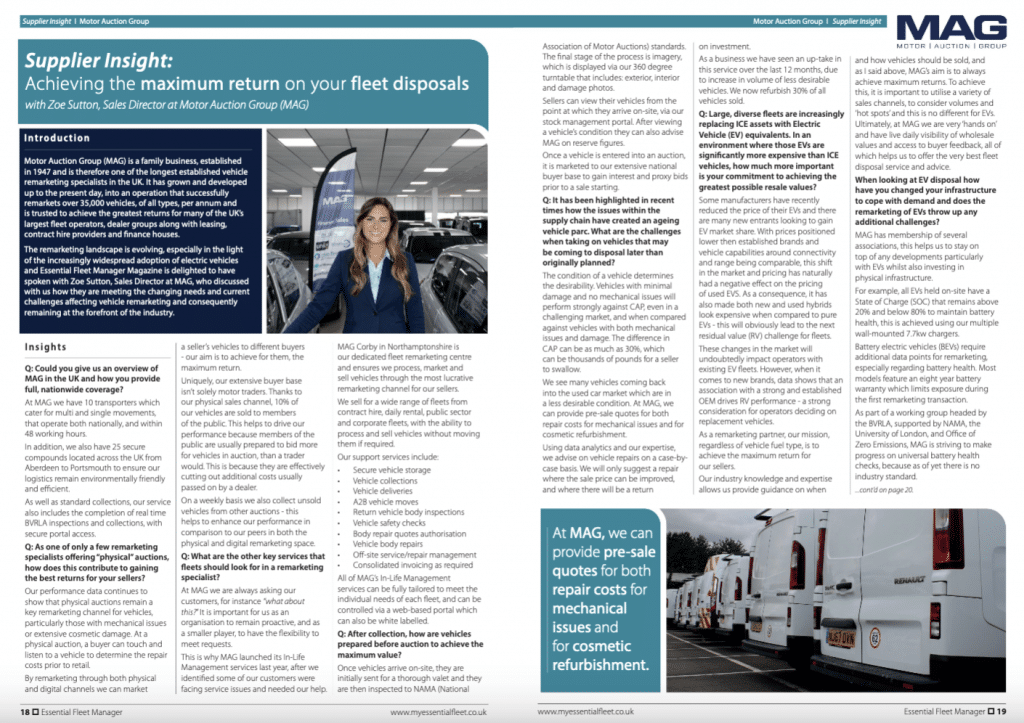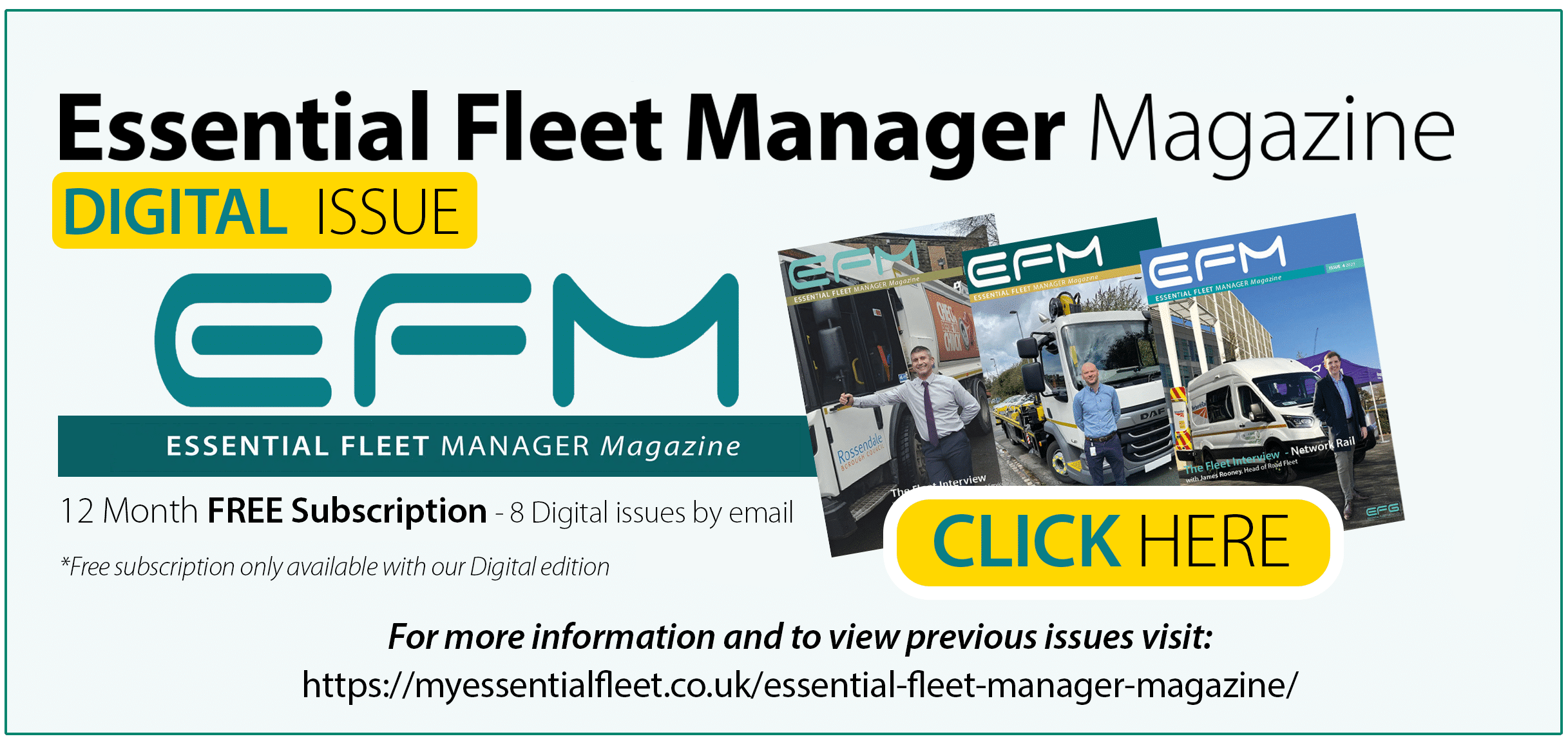With Zoe Sutton, Sales Director at Motor Auction Group (MAG)
Introduction
Motor Auction Group (MAG) is a family business, established in 1947 and is therefore one of the longest established vehicle remarketing specialists in the UK. It has grown and developed up to the present day, into an operation that successfully remarkets over 35,000 vehicles, of all types, per annum and is trusted to achieve the greatest returns for many of the UK’s largest fleet operators, dealer groups along with leasing, contract hire providers and finance houses.
The remarketing landscape is evolving, especially in the light of the increasingly widespread adoption of electric vehicles and Essential Fleet Manager Magazine is delighted to have spoken with Zoe Sutton, Sales Director at MAG, who discussed with us how they are meeting the changing needs and current challenges affecting vehicle remarketing and consequently remaining at the forefront of the industry.
Insights
Q: Could you give us an overview of MAG in the UK and how you provide full, nationwide coverage?
At MAG we have 10 transporters which cater for multi and single movements, that operate both nationally, and within 48 working hours.
In addition, we also have 25 secure compounds located across the UK from Aberdeen to Portsmouth to ensure our logistics remain environmentally friendly and efficient.
As well as standard collections, our service also includes the completion of real time BVRLA inspections and collections, with secure portal access.
Q: As one of only a few remarketing specialists offering “physical” auctions, how does this contribute to gaining the best returns for your sellers?
Our performance data continues to show that physical auctions remain a key remarketing channel for vehicles, particularly those with mechanical issues or extensive cosmetic damage. At a physical auction, a buyer can touch and listen to a vehicle to determine the repair costs prior to retail.
By remarketing through both physical and digital channels we can market a seller’s vehicles to different buyers – our aim is to achieve for them, the maximum return.
Uniquely, our extensive buyer base isn’t solely motor traders. Thanks to our physical sales channel, 10% of our vehicles are sold to members of the public. This helps to drive our performance because members of the public are usually prepared to bid more for vehicles in auction, than a trader would. This is because they are effectively cutting out additional costs usually passed on by a dealer.
On a weekly basis we also collect unsold vehicles from other auctions – this helps to enhance our performance in comparison to our peers in both the physical and digital remarketing space.
Q: What are the other key services that fleets should look for in a remarketing specialist?
At MAG we are always asking our customers, for instance “what about this?” It is important for us as an organisation to remain proactive, and as a smaller player, to have the flexibility to meet requests.
This is why MAG launched its In-Life Management services last year, after we identified some of our customers were facing service issues and needed our help.
MAG Corby in Northamptonshire is our dedicated fleet remarketing centre and ensures we process, market and sell vehicles through the most lucrative remarketing channel for our sellers.
We sell for a wide range of fleets from contract hire, daily rental, public sector and corporate fleets, with the ability to process and sell vehicles without moving them if required.
Our support services include:
• Secure vehicle storage
• Vehicle collections
• Vehicle deliveries
• A2B vehicle moves
• Return vehicle body inspections
• Vehicle safety checks
• Body repair quotes authorisation
• Vehicle body repairs
• Off-site service/repair management
• Consolidated invoicing as required
All of MAG’s In-Life Management services can be fully tailored to meet the individual needs of each fleet, and can be controlled via a web-based portal which can also be white labelled.
Q: After collection, how are vehicles prepared before auction to achieve the maximum value?
Once vehicles arrive on-site, they are initially sent for a thorough valet and they are then inspected to NAMA (National Association of Motor Auctions) standards. The final stage of the process is imagery, which is displayed via our 360 degree turntable that includes: exterior, interior and damage photos.
Sellers can view their vehicles from the point at which they arrive on-site, via our stock management portal. After viewing a vehicle’s condition they can also advise MAG on reserve figures.
Once a vehicle is entered into an auction, it is marketed to our extensive national buyer base to gain interest and proxy bids prior to a sale starting.
Q: It has been highlighted in recent times how the issues within the supply chain have created an ageing vehicle parc. What are the challenges when taking on vehicles that may be coming to disposal later than originally planned?
The condition of a vehicle determines the desirability. Vehicles with minimal damage and no mechanical issues will perform strongly against cap, even in a challenging market, and when compared against vehicles with both mechanical issues and damage. The difference in cap can be as much as 30%, which can be thousands of pounds for a seller to swallow.
We see many vehicles coming back into the used car market which are in a less desirable condition. At MAG, we can provide pre-sale quotes for both repair costs for mechanical issues and for cosmetic refurbishment.
Using data analytics and our expertise, we advise on vehicle repairs on a case-by-case basis. We will only suggest a repair where the sale price can be improved, and where there will be a return on investment.
As a business we have seen an up-take in this service over the last 12 months, due to increase in volume of less desirable vehicles. We now refurbish 30% of all vehicles sold.
Q: Large, diverse fleets are increasingly replacing ICE assets with Electric Vehicle (EV) equivalents. In an environment where those EVs are significantly more expensive than ICE vehicles, how much more important is your commitment to achieving the greatest possible resale values?
Some manufacturers have recently reduced the price of their EVs and there are many new entrants looking to gain EV market share. With prices positioned lower then established brands and vehicle capabilities around connectivity and range being comparable, this shift in the market and pricing has naturally had a negative effect on the pricing of used EVS. As a consequence, it has also made both new and used hybrids look expensive when compared to pure EVs – this will obviously lead to the next residual value (RV) challenge for fleets.
These changes in the market will undoubtedly impact operators with existing EV fleets. However, when it comes to new brands, data shows that an association with a strong and established OEM drives RV performance – a strong consideration for operators deciding on replacement vehicles.
As a remarketing partner, our mission, regardless of vehicle fuel type, is to achieve the maximum return for our sellers.
Our industry knowledge and expertise allows us provide guidance on when and how vehicles should be sold, and as I said above, MAG’s aim is to always achieve maximum returns. To achieve this, it is important to utilise a variety of sales channels, to consider volumes and ‘hot spots’ and this is no different for EVs. Ultimately, at MAG we are very ‘hands on’ and have live daily visibility of wholesale values and access to buyer feedback, all of which helps us to offer the very best fleet disposal service and advice.
Q: When looking at EV disposal how have you changed your infrastructure to cope with demand and does the remarketing of EVs throw up any additional challenges?
MAG has membership of several associations, this helps us to stay on top of any developments particularly with EVs whilst also investing in physical infrastructure.
For example, all EVs held on-site have a State of Charge (SOC) that remains above 20% and below 80% to maintain battery health, this is achieved using our multiple wall-mounted 7.7kw chargers.
Battery electric vehicles (BEVs) require additional data points for remarketing, especially regarding battery health. Most models feature an eight year battery warranty which limits exposure during the first remarketing transaction.
As part of a working group headed by the BVRLA, supported by NAMA, the University of London, and Office of Zero Emissions, MAG is striving to make progress on universal battery health checks, because as of yet there is no industry standard.
When it comes to re-selling used EVs it is about educating dealers. There seems to plenty of incentives to encourage consumers into new EVs however, very little for used. We often educate our ‘dealer’ buyers about the benefits of EVs so they can pass this information to their potential consumers, for example charging an EV outside of peak times can save money, and in addition, how an EV can help to avoid for example the impending extension of ULEZ charges.
Specialised remarketing centres for BEVs and plug-in hybrids (PHEVs) can add value, as giving buyers peace of mind naturally increases the sale price with the opportunity to up-sell additional services and warranties.
Q: Could you give an example of remarketing EVs for a specialist operator, and take us through the steps.
To give you an example, we worked with London Fire Brigade (LFB) whose fleet was managed by Babcock and they had specific remarketing requirements to fulfil. They wanted to sell a batch of BMWi3s which were all very similar in age, mileage, colour, and specification.
LFB also wanted their employees to be able to bid on the vehicles along side our overall buyer base.
We advised the importance of not flooding the wholesale market in order to maintain the RVs.
The vehicles were processed for sale as usual with the addition of the livery being removed. This included being valeted, NAMA inspected and imaged before being marketed to both LFB and Babcock employees and additionally to MAG’s buyer base.
Through the whole process we worked with Babcock to ensure that all interested staff were registered for the auctions. A standalone, 24-hour timed auction, for 10 vehicles took place on a fortnightly basis.
We were delighted to be able to assist LFB and Babcock with remarketing these vehicles to both employees and to the motor trade, offering maximum return and reduced risk.
If any organisation has employees who are interested in purchasing company vehicles, having access to an auction like this can be a great perk, however, it does come with a huge risk.
It is worth noting that if a business wishes to sell a vehicle to any employee directly this sale would be subject to legal rights under the Consumer Rights Act 2015, meaning they could potentially be held responsible for any repairs or replacement. But by allowing employees access to a vehicle auction in order to purchase a vehicle previously owned by the company then this Act does not apply. MAG, therefore can support fleets to provide their employees with an opportunity to purchase vehicles in this way.
Q: What do you see as the main challenges that will arise on the road to 2030 and the ban on the sale of new petrol and diesel (only) cars and vans?
The key areas for concern that I feel need addressing as we approach the 2030 deadline include both improving consumer knowledge and ensuring there are sufficient financial incentives offered to support businesses, and consumers, to make the switch to EVs. In addition, a comprehensive strategy on charging infrastructure and further support for universal battery health checks, are also just as important.
For how the future looks, I suppose it depends on the political landscape we face leading up to, the 2030 deadline. It may well be extended, for example as Germany have agreed, to 2035, but the future and how well we deal with the challenges will be as always to achieve the maximum return for our sellers.
As I mentioned previously, what has been perhaps the most interesting development is that hybrid vehicles are starting to look considerably more expensive than fully electric vehicles and I suspect that hybrid RVs will be the next hurdle for fleets who are yet to switch to full EV.
For more information visit: https://www.mag.co.uk/


The above article appeared in Essential Fleet Manager Magazine – Issue 5(23)





